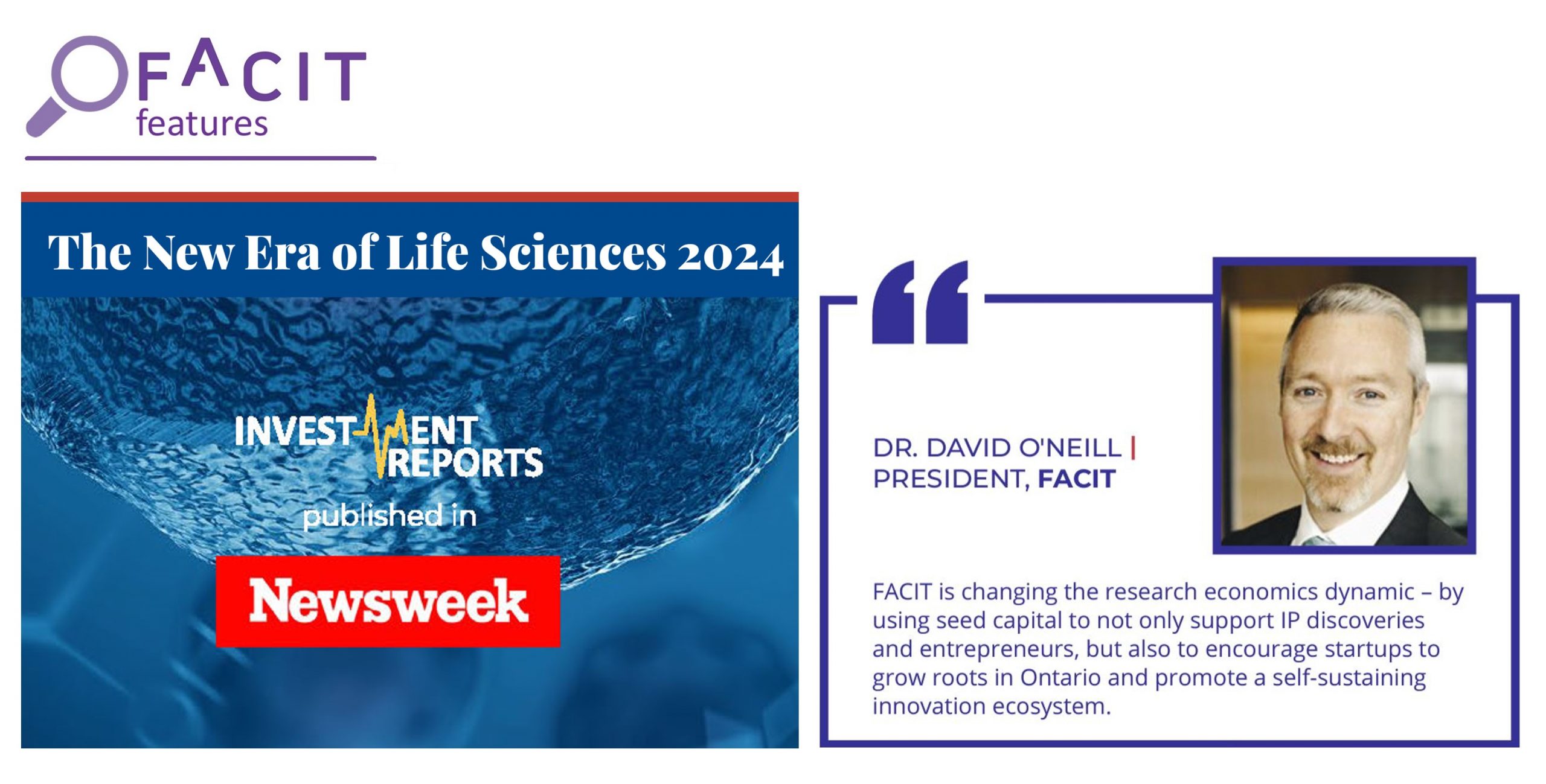FACIT President discusses early-stage investing in Canada in an interview for Newsweek’s Investment Reports

FACIT is an innovative organization focused on bridging the gap between cancer research breakthroughs and their commercialization, thereby accelerating the journey of scientific discoveries from the laboratory to the marketplace. Through strategic partnerships, investment, and mentorship, FACIT plays a pivotal role in transforming Ontario’s cancer research projects into viable health solutions and economic opportunities.
How far has innovation in the fight against cancer come?
There’s been outstanding progress that has been decades in the making, driving cancer survival rates and improving outcomes significantly. However, even with breakthroughs like PD-1 inhibitors, we see that cancer can develop resistance and come back. While we’ve made substantial progress, especially in specific areas, there’s still a long journey ahead. There’s ample opportunity for further innovation in the oncology space.
How do you identify opportunities for innovation in cancer research and investment?
To understand how we identify opportunities, it’s essential to recognize the multi-decade strategy Ontario has embarked upon. This involves tackling the larger question of identifying, supporting, and realizing the benefits of cancer research, not just for Ontarians but globally. We’re part of a network connected to the Ontario Institute of Cancer Research (OICR), which spans over 3,000 researchers across the province. This unique network allows us to delve into projects early, understand them, work with entrepreneurs, and provide initial funding for proof of concept research. It’s this approach that enables us to spot potential winners early and nurture them within the province. Our continuum of seed capital investment then creates a domestic path for research translation, allowing us to further de-risk and create value for these promising innovations. It also allows FACIT to be a net importer of IP in addressing the typical IP outflow.
How do you balance scientific breakthroughs with commercial viability in your projects?
In the early stages, projects can be speculative, which is a natural part of early-stage investing. We understand that not all projects will have a positive outcome, but that’s acceptable. Our approach involves reducing the likelihood of negative outcomes by incorporating market feedback, focusing on unmet medical needs, and areas where there’s a demand for innovation. This strategy helps us maintain a balance between pursuing scientific breakthroughs and ensuring commercial viability.
Can you illustrate how partnerships have been instrumental in bringing cancer treatments from lab to market?
Indeed, acting as a bridge at the intersection of public research and the private market is critical. We’ve shifted from the traditional model of licensing out IP at the earliest stages due to a lack of local industrial receptors. Instead, we’re focusing on using seed capital to not only support research and entrepreneurs but also to encourage startups to grow roots in Ontario. This approach changes the dynamic, promoting a feedback loop between research, economics, and clinical trials, fostering an innovative ecosystem.
What tensions do you perceive in Canada’s approach to anchoring companies in the healthcare sector, and how can these be addressed?
There is definitely a tension, perhaps not as high as it should be. The healthcare market’s potential is enormous, and Canada’s share could significantly impact jobs, returns, and the innovation environment. The absence of anchor companies stems from a complex cultural and economic phenomenon. Historically, Canada has focused on other sectors, missing out on capitalizing on health innovations. The challenge lies in creating an ecosystem where domestic capital and industrial development are more prevalent, something governments alone can’t solve.
“FACIT’s role is to actively compete in the marketplace for IP destinations, fostering a local ecosystem that supports strong company development.”
What areas of cancer research and treatment are currently most exciting to you, and how do you see them changing the landscape of cancer care?
Cell therapy and radiopharmaceuticals are at the forefront, making significant impacts on patient care, though currently for a small number of patients. These areas are unlocking investment and interest in cancer treatment, promising a future where more innovative solutions can emerge. We’re looking at a range of therapeutic modalities and devices that could bring incremental but transformative changes to patient care.
What advice would you give to researchers and entrepreneurs looking to make an impact in the oncology space?
While I hesitate to give advice to experts in their fields, it’s crucial for attracting investment to address basic questions: How does their technology stand out? How does it solve a problem for patients? Who will pay for it? Understanding these factors is essential, especially in a space where financing can be a challenge. Our approach with entrepreneurs is partnership-oriented; we aim to support them by identifying and overcoming potential hurdles to attract follow-on investment.
Looking into the future, what is your vision for FACIT?
Our goal is to align research excellence with economic benefits and patient impact within a self-sustaining ecosystem. Ideally, FACIT would become redundant because we’ve succeeded in building an environment where innovation thrives independently. We hope to see the development of anchor companies within Ontario, mirroring successes in other sectors, thus ensuring that university research makes a tangible difference in patients’ lives.
Dr. David O’Neill’s interview, along with a number of industry leaders, appeared as part of Newsweek’s Investment Reports: The New Era of Life Sciences 2024. Read report here.
About FACIT
FACIT is an award-winning commercialization venture firm that builds companies with entrepreneurs to accelerate oncology innovation, with a portfolio that has attracted more than $1.6 billion in investment to Ontario. Blending industry experience, capital and the unsurpassed clinician-scientist network of its strategic partner the Ontario Institute for Cancer Research (OICR), FACIT capitalizes on the province’s investment in research and healthcare to the benefit of the local economy and patients worldwide. Cancer Breakthroughs. Realized. facit.ca

PORTFOLIO
FACIT actively manages our diverse portfolio of Ontario oncology assets (including therapeutics, imaging, diagnostics, and technology platforms) that span all stages of commercialization, from proof-of-concept to clinical development.

FUNDS
With critical seed funding, FACIT makes it possible for Ontario’s best cancer research discoveries to compete globally and reach patients.